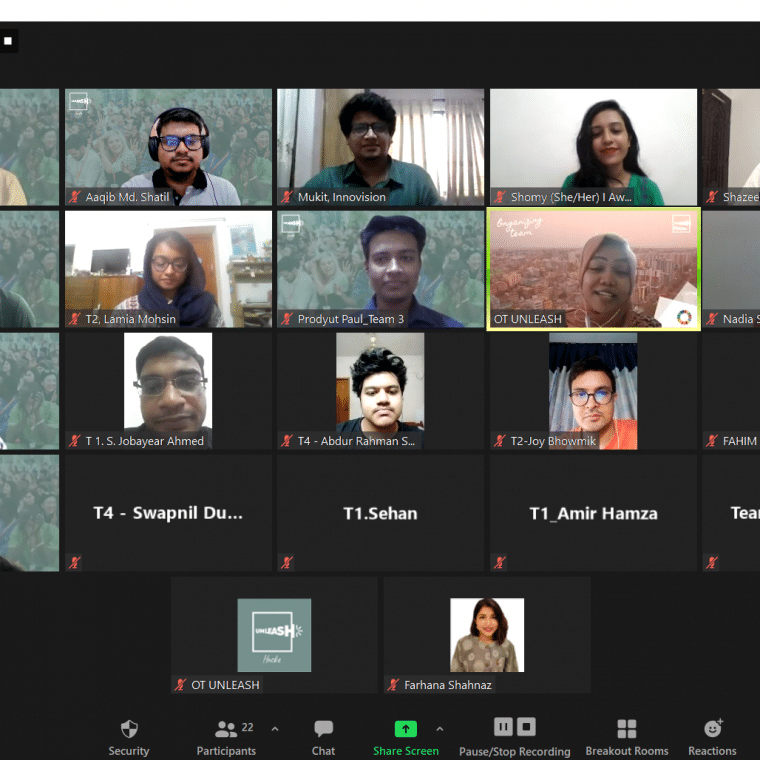
UNLEASH Hacks teams address climate change, learning disruption and air pollution across India, Nepal, and Bangladesh
Recent UNLEASH Hacks participants are developing solutions to address long-standing climate change issues, learning disruption, and air pollution
Young changemakers are developing solutions for challenges their communities and countries face through the UNLEASH Hacks, which are localized hackathons designed to enable young people to address sustainability challenges in specific contexts worldwide.
Over the past months, participants at various UNLEASH Hacks events have developed solutions to global social issues ranging from health crisis to social inequality, climate change to air pollution, and learning gaps to national infrastructural challenges.
As the world continues to advance in science, technology, the economy and areas of our lives and work, we continue to experience the rise of global challenges that prevent everyone from benefiting from such global growth.
In these recent UNLEASH hacks organized over a collaborative two days of learning and designing for the SDGs, UNLEASH alumni, and their network convened passionate young changemakers to work with local stakeholders and community leaders to collectively solve local problems globally.
Three winning teams are typically selected from each hack event, receiving 400, 300, and 200 USD as prizes for 1st, 2nd, and 3rd place winners, respectively, to further develop their solutions.
On Saturday, July 24, 2021, nearly 120 young people formed multiple teams across Bangladesh, India, and Nepal to address learning disruption, air pollution, and climate change. Here’s what these young change-makers are designing to tackle these issues:
Bangladesh: Green Action
The complete shutdown of schools in Bangladesh due to the COVID-19 pandemic significantly impacted the country. The nearly 40 million children enrolled in schools across Bangladesh have been affected. Before the pandemic, the country struggled with a severe educational crisis, including a high drop-out rate. The UNLEASH Bangladesh Hacks focused on developing forward-thinking ideas to bridge the gap between quality access to education and the future of learning and skills development. Green Action, the hacks’ winner, is developing the Green Toolkit, a learning toolkit to provide children with comprehensive education by effectively engaging in activity-based and hands-on learning. The solution seeks to leverage blended learning techniques through projects, in- and out-of-classroom activities to keep students learning. “The UNLEASH experience has taught us the value of individual and collective effort, and most importantly leadership,” the team’s representative, Lamia Mohsin, stated. The team’s next step is to utilize the hacks’ fund to design the toolkit and bring their proposed solution to reality.
India: Multiple Winners
India faces a concerning environmental issue, air pollution. Nearly 1.7 million people died of air pollution in 2019, about 18% of all national deaths. Air pollution caused India $36.8 billion in 2019, resulting from its impacts on public health, the environment, and the economy. The UNLEASH India Hacks focused on developing innovative solutions to influence practices and solutions to mitigate air pollution and achieve SDGs 11, Sustainable Cities and Communities, and SDG 13, Climate Change. Three winners were selected and awarded 1000 USD each to implement their solutions. Here is an overview of what each team is developing:
Team: Grow More
Grow More aims to connect farmers and public-private companies through a behavioral and revenue generation model. Their solution is to Diversify the Use of Rice Crop Residue to Mitigate Air Pollution in India. In the Indian States of Punjab and Haryana, the team will focus on the practices of stubble burning, promote non-burning practices and help increase local farmers’ income marginally. The team’s representative, Arunima Singh, mentioned, “The competition has been a wonderful learning experience, both personally and professionally. The unique pedagogy of UNLEASH is an excellent opportunity to learn about the various phases of ideation to design and rapid prototype”.
Team: One
Team one identified that MSMEs in the developing industrial area of Hyderabad struggle to abide by environmental regulations and take care of employees’ health. The team’s solution is a proposed policy umbrella to ensure the Ministry of MSMEs develops a CDM project that will generate carbon credit for MSMEs abiding by environmental regulations, with green bonds to further encourage health expenditure for employees.
Team: NCAP
Team NCAP is focusing on capacitating policy implementation in Rural India through an educational model. The team is developing the Clean Air Implementation Fellowship Program as part of the existing National Clean Air Programme (NCAP). Describing the team’s participation in the UNLEASH Hack, the team mentioned that, “How the solution evolved amidst the discussions with facilitators and experts was extremely organic, and those discussions were insightful.”
All three teams plan to continue discussions, research, and development on their solutions.
Nepal: Bambana Box
Nepal is vulnerable to climate change, resulting in millions of Nepalese being at risk from its impact on reducing agricultural production and food security. The UNLEASH Nepal Hacks sought to develop solutions that improve food and nutritional security and strengthen the climate resilience of vulnerable populations in Nepal. The Hacks’ winner, Bambana Box, a fusion of bamboo sticks and banana leaves, is a lightweight box for packaging and a tool for transporting vegetables. The solution increases vegetables shelf life by one to two days, reducing post-harvest food loss during harvest. The team’s representative, Asmita Bhatta, recalls, “After attending th[e] hack, my thought process has transformed into a global thinker for every action I am associated with.” The team acknowledged being motivated by participating in the hack and will continue testing and validating their product as an immediate next step before seeking investment to grow.

